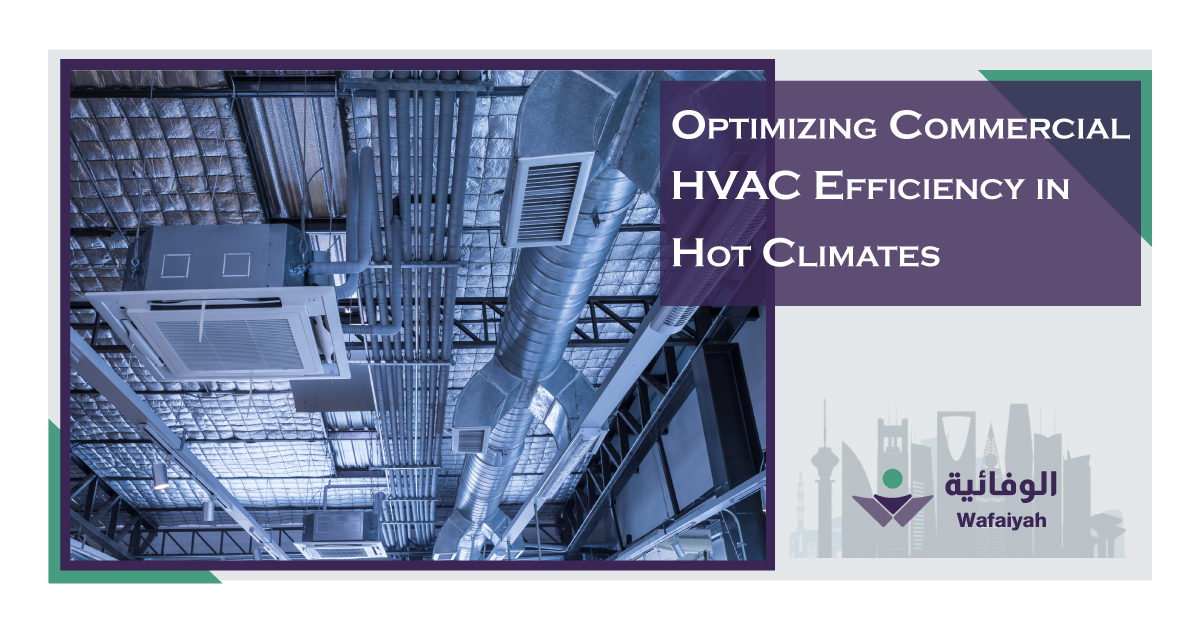The hot climate of Saudi Arabia requires maintaining optimal HVAC efficiency in commercial buildings. During the summer months, the temperature in Saudi Arabia increases significantly. This extreme heat causes more energy consumption and operational costs. It also uplifts more loads on cooling units and HVAC systems. The construction industry presents effective strategies for local climate concerns to improve construction standards with thorough research. Saudi building codes and regulatory compliance also provide guidance to optimize commercial HVAC efficiency. We will discuss effective strategies that are helpful in improving the functional performance of heating, ventilation, and cooling systems installed in commercial buildings in Saudi Arabia.
The heating, ventilation, and cooling systems installed in commercial buildings in hot climates face challenges in providing effective functionality. During extreme temperatures, the systems work harder because they have high cooling loads with increased energy consumption levels. Over-energy consumption also affects the system’s lifespan and increases maintenance costs. Excessive humidity in the environment is also a challenge to maintaining a better indoor environment. The humidity control issue is also a challenge for commercial cooling systems. During peak hours, the electricity accounts for commercial properties consume more units, and the peak demand costs increase. Maintaining a comfortable indoor environment and indoor air quality is very important for commercial spaces not to disrupt commercial activities and employees’ comfort.
Preventive Maintenance
Regular maintenance and inspection are the best ways to maintain the perfect functionality of HVAC systems. Regularly clean the air filters and replace the damaged parts. Checking refrigerant levels and cleaning coils are also useful in keeping the cooling units clean and maintained. You should conduct proper checking and testing of the control system. A periodic maintenance contract is recommended to maintain the quality of HVAC systems installed in commercial buildings. Hire a professional and reliable HVAC contractor to regularly maintain the system.
Upgrade to Energy-Efficient HVAC Systems
Commercial property owners should invest in modern and high-quality HVAC systems that provide high efficiency and manage high loads. The advanced units provide energy savings and cost savings. You can upgrade the existing systems to energy-efficient ones for better control over energy consumption. Variable refrigerant flow and (seasonal energy efficiency ratio) SEER units consume less power. Smart heating, ventilation, and air conditioning systems have automatic features for controlling the temperature that optimize the performance of the system. An idea of efficient solutions is the best technique to optimize the performance of the system. Smart thermostats and building automation systems also help to maximize temperature settings and energy management.
Improve Insulation and Sealing
Insulation is also an effective technique to minimize the loads on the cooling units. You can install reflective roofing materials to reduce solar heat effects. You can upgrade window installation and apply sealing air leaks. Use renewable energy sources like solar panels and geothermal cooling solutions. Hybrid cooling systems are also considered the best for optimizing system performance. You can implement demand response strategies to reduce workloads on air conditioning systems.
Optimize Airflow and Ventilation
Commercial spaces must have a perfect plan and design for HVAC systems. A smart ventilation system reduces the excessive load on cooling units. An effective ventilation system makes the air flow better, which reduces heat impacts. You can use ceiling fans to improve air circulation and utilize duct systems to balance airflow. Integrating energy recovery ventilators is also an excellent strategy to maintain better indoor air quality. It maintains the cooler environment without exerting an overload on cooling units.
Humidity Affects Commercial HVAC Efficiency in Hot Climate
Office buildings, warehouses, manufacturing facilities, and other commercial structures in Saudi Arabia are just a few of the many places where humidity issues might arise. When the latent load is considerable in many HVAC applications—either because of significant internal moisture creation or because of communication with humid external conditions—the cooling and dehumidification coil is unable to adequately meet the building’s dehumidification needs. Depending on the use, a mismatch between the latent load of the building and the latent capacity of the equipment can lead to mold and condensate damage, worse occupant comfort and productivity, and higher energy expenditures due to reheating.
The growing need for outdoor air in buildings to improve indoor air quality makes these issues worse. The humidity in the environment is not directly controlled in the majority of commercial and residential applications. The air is driven below the dew-point temperature in order to fulfill the building’s sensible loads, which also happens to provide dehumidification as a byproduct of the cooling process. Because of the fluctuating match between the equipment’s latent capacities in relation to the sensible and latent loads, the relative humidity in the space is indirectly controlled and fluctuates. Some commercial settings, like shopping malls, have direct control over the room’s humidity and temperature.
Solutions to Optimize Air-Conditioning System
Operating the constant-air-volume system at whatever compressor capacity is necessary to maintain both space temperature and humidity at or below acceptable levels is now the most widely used technique for meeting the simultaneous loads of commercial space. The space humidity is permitted to drop below the setpoint if the system’s operation is controlled by the temperature of the space, which results in higher energy consumption to remove more moisture than is required. The space temperature is only allowed to drop as far as necessary, usually to the heating setpoint. Before reheating, it is necessary to maintain comfortable circumstances if the humidity in the space determines the system’s functioning. Overcooling the air and subsequently warming it both incur costs if waste heat is unavailable.
A thorough cooling system design is the first step in meeting dehumidification requirements. When it is designed and chosen, the HVAC and dehumidification system must meet both visible and latent loads. However, off-design conditions frequently create scenarios of low sensible load but high latent load since design conditions usually occur during times of high sensible load. The system must be operated to maintain temperature and humidity within a target range while matching equipment performance with building loads across a wide range of off-design operating situations.
Wafiyah – Your Partner in HVAC Excellence!
In scorching climates, keeping your commercial space cool and energy-efficient is a challenge. Wafiyah offers the best solutions for optimizing HVAC systems to ensure peak performance while reducing energy costs. Our expert team provides advanced maintenance, installation, and upgrades tailored to extreme temperatures. With state-of-the-art technologies, we increase cooling efficiency, extend equipment lifespan, and lower operational expenses. Whether it’s a large commercial facility or an industrial space, Wafiyah delivers reliable, cost-effective HVAC services designed for sustainability and comfort. Don’t let the heat compromise your business—trust Wafiyah for superior HVAC performance. Contact us today to optimize your cooling system for maximum efficiency!
Conclusion
Commercial buildings in Saudi Arabia need the installation of perfect commercial HVAC systems to provide a comfortable environment for employees and visitors. You should implement predictive measures and a proactive approach to maintain the system and optimize its performance efficiency. Integrate your HVAC system with smart controlling systems, advanced devices, and renewable energy sources. Utilize insulation to reduce heat effects. Invest in advanced and smart heating, ventilation, and cooling systems that deliver the best energy management and cooling functionality in commercial spaces.
Frequently Asked Questions
What are the challenges that commercial HVAC systems face in hot climate regions?
- high cooling loads
- humidity control issues
- peak demand costs
What is the best way to optimize HVAC efficiency in commercial spaces in Saudi Arabia?
Follow the building codes and regulatory compliance. Implement smart energy management and energy-efficient solutions to optimize HVAC efficiency in commercial spaces in Saudi Arabia.
Who is the top HVAC contractor in Saudi Arabia?
Wafaiyah is the top HVAC contractor in Saudi Arabia.
How does a proper ventilation system regulate the functionality of air conditioning systems?
A proper and well-designed ventilation system improves air circulation and reduces HVAC load.

